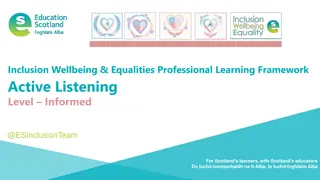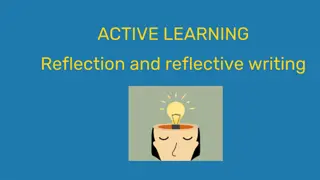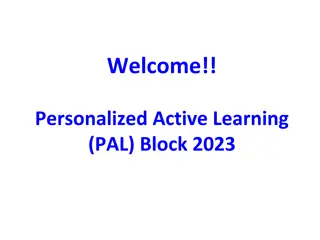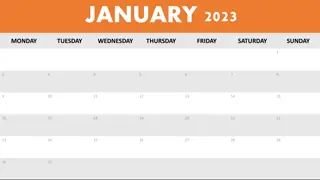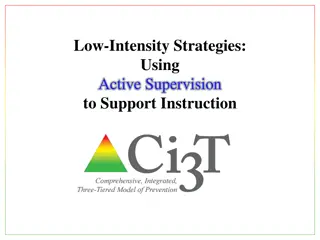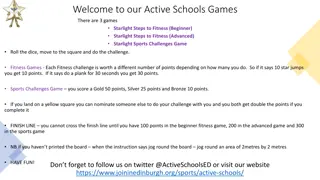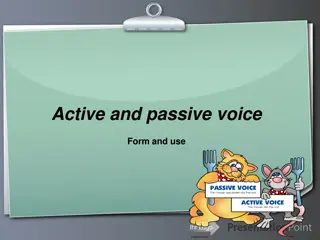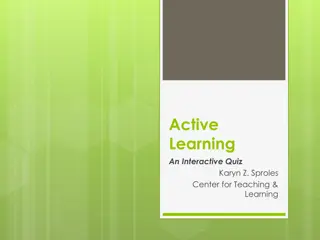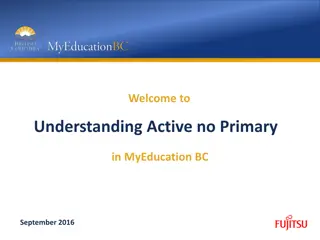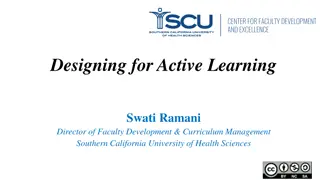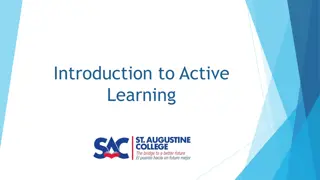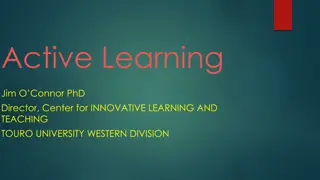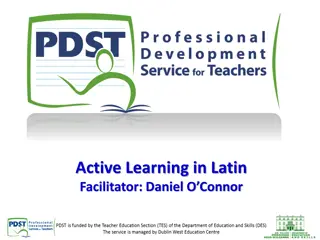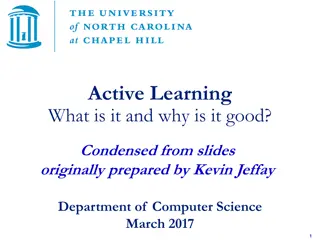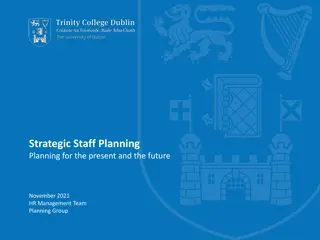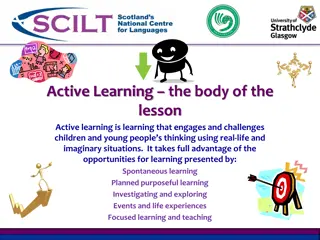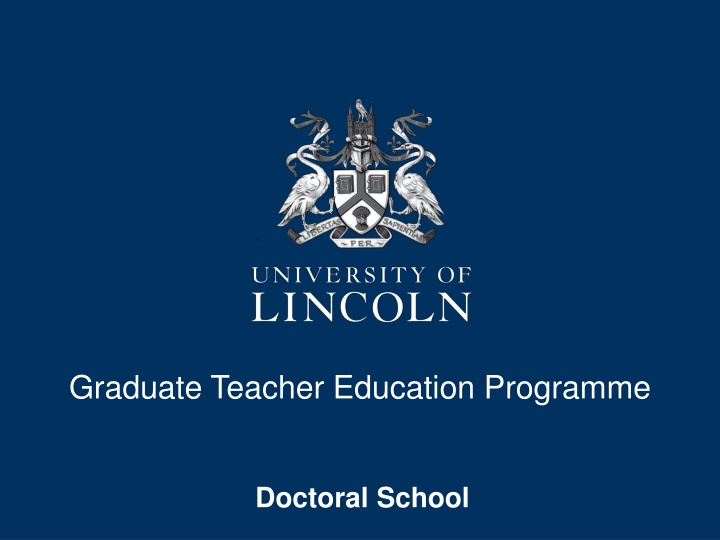
Effective Graduate Teacher Education Programme at Doctoral School
Explore a comprehensive Graduate Teacher Education Programme at the Doctoral School focusing on active learning, student assessment, feedback delivery, and inclusive teaching resources. Develop key skills to excel in teaching and supporting student learning in higher education.
Download Presentation

Please find below an Image/Link to download the presentation.
The content on the website is provided AS IS for your information and personal use only. It may not be sold, licensed, or shared on other websites without obtaining consent from the author. If you encounter any issues during the download, it is possible that the publisher has removed the file from their server.
You are allowed to download the files provided on this website for personal or commercial use, subject to the condition that they are used lawfully. All files are the property of their respective owners.
The content on the website is provided AS IS for your information and personal use only. It may not be sold, licensed, or shared on other websites without obtaining consent from the author.
E N D
Presentation Transcript
Graduate Teacher Education Programme Doctoral School
Programme outline Day one Welcome, introductions & personal goals for the programme How do students learn? Planning for active learning Small group teaching Large group teaching Planning activity
Programme outline Day two Assessment and giving feedback to students Developing effective learning environments Supporting students in distress Applying for Professional Recognition with the HEA Programme summary, evaluation and close
Programme learning outcomes On completion of this programme you should be able to; Plan effectively for active learning in large and small group teaching Confidently deal with challenging situations in the classroom Participate in the assessment of students and provide constructive feedback to help them learn successfully
Programme learning outcomes Make appropriate use of inclusive learning resources and the virtual learning environment to support student learning Understand the requirements for making an application for Associate Fellowship of the Higher Education Academy
Programme team Dr Kelly Sisson Dr Jonathan Cooper Jasper Shotts Dr Kirsty Miller Ellie Forbes Jacqueline Mayer Maeve O Dwyer
Introductory round Please introduce yourself to the rest of the group Your name & School Your area of research Whether you have any previous experience of teaching and supporting learning
Hopes and fears Take two different coloured post it notes On one record your hopes for this programme What do you hope to learn about in the next two days? On the other record your fears in relation to teaching in HE Be prepared to share your thoughts with the group
Session learning outcomes On completion of this session you should be able to; Identify factors that create a positive learning experience Understand key principles of constructivist learning theory
What helps you to learn? Think of an example of your own successful learning or a positive learning experience you have had Make notes on the following; What factors helped you to learn? What did the teacher do? What did you do? What was the learning environment like? This does not have to be learning in an academic environment
What does the literature say? Students learn best when they construct their own knowledge instead of having someone construct it for them Underpinned by constructivist learning theory Learning is an active process of creating meaning from different experiences Students learn best by doing, and trying to make sense of something on their own with the teacher as a guide to help them (Brooks & Brooks, 1993)
Principles of constructivist learning theory By applying theory to real world problems When they have opportunities to reflect When learning is active How do students learn best? When they are involved in the process of inquiry & discovery Through solving problems
Session learning outcomes On completion of this session you should be able to; Identify the factors that influence your approach to planning Ensure that learning outcomes, activities and assessments are appropriately aligned Structure teaching sessions to provide maximum opportunity for learning
FACTORS THAT INFLUENCE PLANNING
Scenario You have been asked to deliver a session on a topic that is slightly outside of your comfort zone to a group you have not previously met What would you need to know in order to plan an effective session for this group? How would you typically go about planning this session?
Factors that influence planning Context Who are your students? Full time/part time; new to HE/returning to HE; cultural mix Level First year? Postgraduate? Previous knowledge What do they already know? Where should you start from? Content/ topics What is the new material that you hope to introduce to them? What is essential? What is desirable?
Approaches to planning (Fry et al, 2006) Type of approach Description Systematic Proceeds from identifiable needs to predictable (learning) outcomes. Also known as outcomes-based planning Intellectual Places primary emphasis on the disciplinary content and examines the body of information, attitudes and skills student will need to know Problem-based Identifies one or more specific problems to be addressed, not defined by objectives and emphasises the process of understanding the problem Creative/experiential Involves teaching/learning by experience and generally through the dynamics of group process. Training/workshop-based Outcomes are defined by the skills acquired through the training workshop
The systematic approach and outcomes-based planning The specification of outcomes if the first step in the systematic approach Shifts the focus from the knowledge base of the teacher to the knowledge needs of the student A more learner centred approach
Plan outcomes Outcomes based planning Revision Sequence topics Assess the outcomes Assess student characteristics Design the learning activities Implement
Advantages of outcomes based planning It allows teachers to clarify for themselves the implicit outcomes that are always part of any teaching and learning activity It allows for reflection on all aspects of pedagogical practice It allows students to have a clearer understanding of what they can expect This in turn increases motivation which can lead to improved performance
Matching learning outcomes, activities and assessment Matching learning outcomes, activities and assessment optimises the conditions for quality learning This is known as constructive alignment Constructive = students construct meaning through relevant learning activities Alignment = how the teacher sets up the learning environment
Group activity Read through the given learning outcomes For each one identify An appropriate learning activity or activities An appropriate method of assessing student learning
Pay attention! How long can you reasonably expect your students to pay attention for in class?
What do we know about attention? The exact length of the average attention span is very hard to accurately measure (Wilson & Korn, 2007) and not known Lapses in attention occur frequently Very short lapses in attention are more common than longer breaks Lapses in attention occur more frequently as the session progresses
Attention and active learning There is a strong relationship between attention and active learning Attention is less likely to lapse when students are engaged in active learning Students are more attentive during active learning and immediately afterwards
What are the implications for planning? Sessions are most effective when periods of the tutor talking are broken up with periods of active learning We should expect lapses in attention and plan accordingly
Pay attention! How can you maintain the attention of your students throughout the session? What might you do at the start to capture their attention? What might you do at the end?
Strategies for capturing attention Change the level and tone of your voice Use props or visuals Make a startling statement or give a quote Write a challenging question on the board Play music Choose relevant examples
Strategies for capturing attention Teach at the right level of difficulty Use humour even if it s a joke about yourself Establish the routine, task and time limit Plan carefully and fully and make this visible to students (SIGNPOSTS) Tell stories
Some thoughts about beginnings and endings Endings Beginnings Assess learning Make links Evaluate the session Say farewell Setting the scene Make links Find out what they know Arouse interest
One minute paper How will the material we have covered this morning change the way you approach your teaching practice?
References Biggs, J. (2003) Aligning teaching and assessment to curriculum objectives. LTSN: Generic centre. Brooks, J. G & Brooks, M. G., (1993) In search of understanding: The case for constructivist classrooms. Alexandria: Association for supervision and curriculum development. Fry, H., Ketteridge, S. & Marshall, S. (2003) A handbook of Teaching and Learning in Higher Education. (2nd Ed). London: Routledge Falmer. Wilson, K. & Korn, J. H. (2007) Attention during lectures: Beyond ten minutes. Teaching of Psychology. 34 (2) 85- 89

